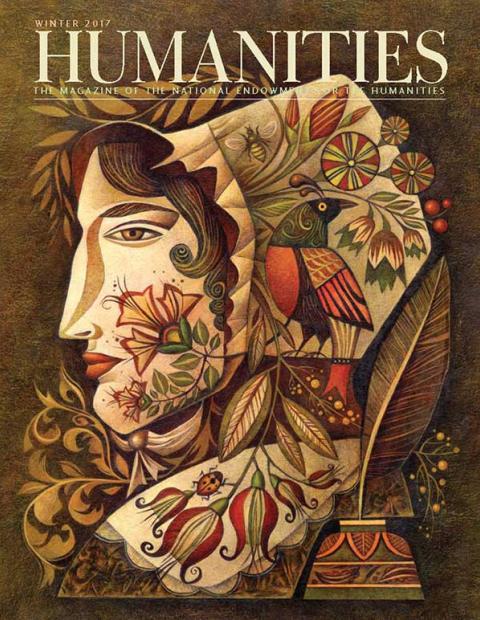If you could have dinner with any historical figure, who would it be? That favorite question of the author interview always makes me wonder whether it really would be enjoyable to dine with Abraham Lincoln or Elizabeth I or William Shakespeare. Wouldn’t they have bigger things to think about than making small talk with me? Fortunately, this issue of Humanities has the perfect answer: Mary Moody Emerson.
Full of verve, even in her eighties, Emerson was a reader, a thinker, and a scholar in the nineteenth-century mode, constantly improving her own mind by direct contact with philosophy and literature, but never in isolation. Her deepest thoughts she expressed in letters to others, including her adoring nephew Ralph Waldo Emerson; she even liked to imagine her favorite authors in dialog with each other, the results of which she generously shared with friends and family. Were she alive today, she would be teaching classes in social media, not taking them. As Noelle A. Baker and Sandra Harbert Petrulionis, editors who have been digitizing Emerson’s papers, demonstrate, Emerson was a dear friend and inspiration to many smart people.
For this issue I interviewed Mark Lilla of Columbia University about people who would like to turn back the clock and recreate the wonders of earlier eras: the so-called reactionary. Lilla is a portraitist working in the history of ideas, and his latest book, The Shipwrecked Mind, deftly considers a number of important figures who have shaped the political landscape in pursuit of a lost golden era, from the philosopher Leo Strauss to Martin Luther and Saint Paul.
John Ruskin was emphatically a man of his own time, the Victorian era, when his influence on the tastes of educated English people was inescapable. Among the various reasons he does not seem poised for a revival is this: If someone argued today that taste was a kind of morality we would assume they were talking about food. Still, he was a major figure of nineteenth-century Britain and, as Danny Heitman shows, there is much to learn from his passion for art and nature.
Your children will be stunned by what you know about pirates after reading a slice of Mark Hanna’s award-winning scholarship on the real history of these waterborne criminals, many of whom turned landlubber after a few years at sea. Piracy was integral to the economic development of several colonial port cities, and apparently not an obstacle to becoming respectable-like.
Two very different books show up in this issue, either of which could make an interesting dinner companion. Wildly popular in its day, The Late Great Planet Earth, an apocalyptic best-seller, inspired many readers and, Erin A. Smith has found, irritated more than a few. And according to Randall Fuller, Darwin’s On the Origin of Species changed many minds, not only about the beginnings of life but also its value.
Mangia!

